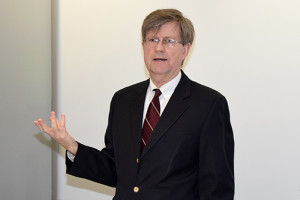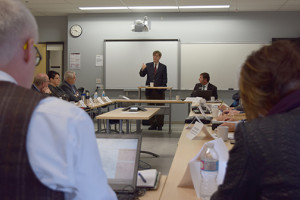 Sean Conway has been out of political office for more than a decade, but the former Ontario Cabinet Minister remains in tune with the challenges facing the province. That’s why Ontario Premier Kathleen Wynne chose him to Chair the Premier’s Highly Skilled Workforce Strategy Expert Panel.
Sean Conway has been out of political office for more than a decade, but the former Ontario Cabinet Minister remains in tune with the challenges facing the province. That’s why Ontario Premier Kathleen Wynne chose him to Chair the Premier’s Highly Skilled Workforce Strategy Expert Panel.
For the past several months, Conway and his four panel colleagues, have been travelling across the province to gather input from stakeholders including business leaders, educators and students. The panel’s task is to assess how well Ontario’s workforce is positioned to meet the needs of its economy and to also recommend how the government can bridge education, training and skills development with the demands of an evolving economic landscape.
While most of the roundtable discussions that have been hosted by the panel have taken place in larger centres, the former Renfrew-Nipissing-Pembroke MPP returned to his home riding to take the pulse of rural Ontario.
 Conway held a three hour discussion at Algonquin College’s Waterfront Campus with about 25 people from Renfrew County. The audience included business owners, human resources professionals, economic development officers, labour market analysts, high school guidance counsellors, and senior administrators from Renfrew County’s District School Boards and Algonquin College.
Conway held a three hour discussion at Algonquin College’s Waterfront Campus with about 25 people from Renfrew County. The audience included business owners, human resources professionals, economic development officers, labour market analysts, high school guidance counsellors, and senior administrators from Renfrew County’s District School Boards and Algonquin College.
The discussions focused on what successful business-education partnerships entailed, how labour market data could be more useful, career counseling for youth and how organizations are dealing with the demands of a technology driven knowledge economy.
Conway, who was the Minister of Education and Minister of Colleges and Universities in the Liberal Government of David Peterson, has been very clear that the panel intends to make recommendations that can be quickly acted upon. The panel’s final report is due to the government in the fall.
More information on the panel and its mandate can be found on the Ontario Government website.
Posted by Jamie Bramburger, Manager of Community and Student Affairs
 “I’m approaching graduation and I’m conflicted about what my next step should be. Should I travel while I still can? Should I pursue more education? Do I try to find a career job right away, even though I don’t have much experience? Help!”
“I’m approaching graduation and I’m conflicted about what my next step should be. Should I travel while I still can? Should I pursue more education? Do I try to find a career job right away, even though I don’t have much experience? Help!”